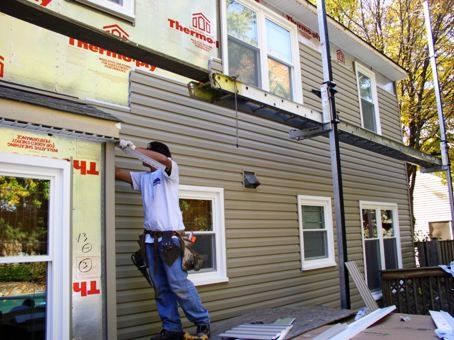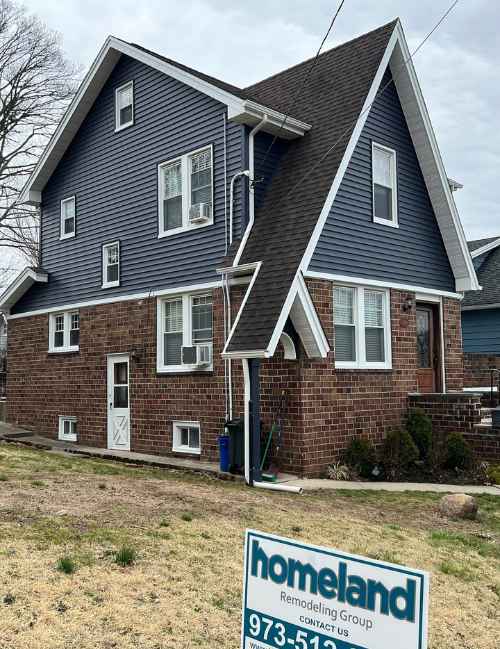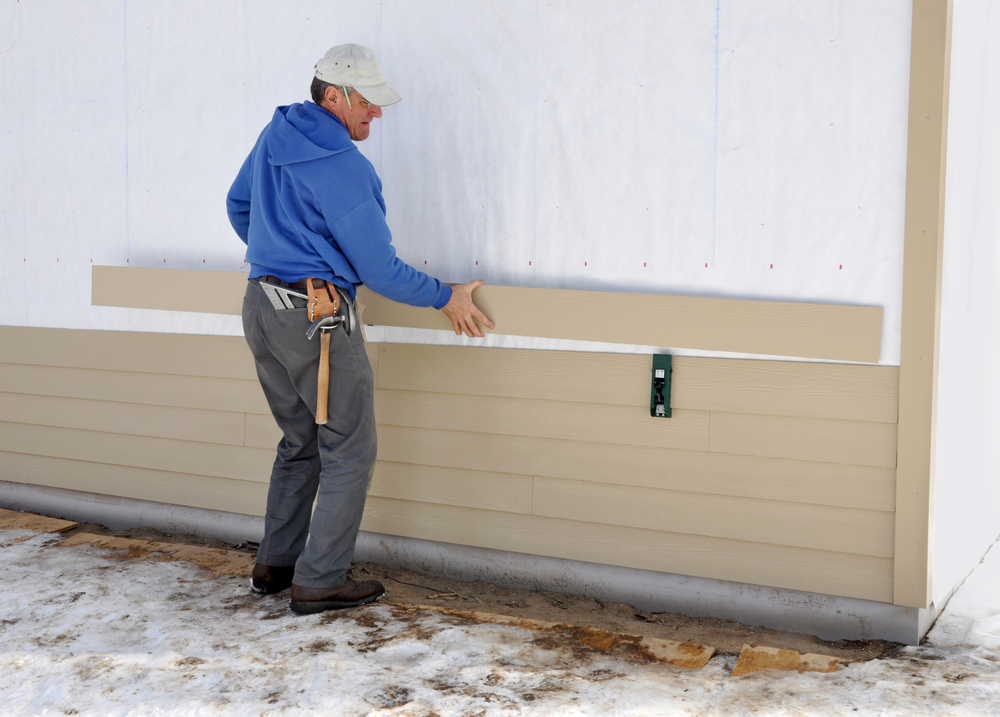Morris Siding Contractor with Years of Expertise in Home Exterior Upgrades
Morris Siding Contractor with Years of Expertise in Home Exterior Upgrades
Blog Article
The Vital Guide to the Different Kinds Of Home Siding and Their Distinct Benefits
In the world of home renovation, picking the right house siding is an essential decision that impacts both aesthetic appeal and useful performance. The range of materials available, such as timber, vinyl, fiber brick, steel, and concrete, each offer special benefits that deal with different requirements and choices. Understanding these distinctions can substantially improve the longevity and value of a residential or commercial property - morris siding contractor. Nonetheless, with so several alternatives to think about, which house siding material absolutely stands apart for your specific task? Checking out these options can cause notified decisions that align with both design and practicality.
Wood Home Siding
Wood siding, a prominent selection for household exteriors, provides a classic aesthetic that integrates all-natural beauty with structural integrity. This siding product is offered in numerous designs, including clapboard, shingles, and board-and-batten, permitting homeowners to customize their façade to match their style choices. Wood exterior siding is normally crafted from resilient types such as cedar, redwood, or want, which are known for their durability and capability to withstand environmental stressors.
Among the primary advantages of timber siding is its superb insulation properties, which can add to energy performance and lower heating expenses. Furthermore, wood house siding is biodegradable, making it an eco-friendly alternative when sourced sustainably. Routine maintenance, including paint or staining, can prolong its lifespan and improve its appearance, permitting home owners to maintain the all-natural appeal of the wood.
Nevertheless, prospective disadvantages consist of susceptibility to insects, rot, and weather damages, necessitating ample treatment and upkeep - morris siding contractor. Regardless of these issues, when appropriately cared for, timber home siding can offer a attractive and resilient service that improves the character of a home while using a cozy, welcoming ambience

Vinyl Siding
Vinyl home siding has become a leading selection for property owners seeking a low-maintenance outside choice that combines longevity and cost. This versatile product is crafted from polyvinyl chloride (PVC), making it immune to numerous weather, including dampness and UV rays. Consequently, vinyl siding does not warp, rot, or fade, making certain lasting visual charm.
One of the main advantages of vinyl exterior siding is its considerable series of shades and designs, permitting house owners to attain the desired appearance for their home without the need for constant repainting. Additionally, vinyl home siding is simple to install, which can considerably minimize labor prices throughout construction or restoration tasks.
Plastic exterior siding also adds to power performance. Many alternatives function insulation backing, which boosts thermal efficiency, helping to keep comfortable interior temperature levels and potentially reducing energy expenses. Its smooth surface area promotes simple cleaning, requiring only regular washing with a yard hose pipe to get rid of dirt and particles.
Fiber Cement Home Siding
Fiber concrete siding has acquired grip among property owners and builders alike due to its impressive mix of sturdiness and visual versatility. Composed of a combination of sand, cement, and cellulose fibers, this house siding option is engineered to endure severe weather condition problems, consisting of high winds, heavy rain, and temperature level changes, making it a lasting selection for property outsides.

Among the main benefits of fiber concrete home siding is its resistance to bugs, such as termites, and its non-combustible nature, offering improved fire safety. morris siding contractor. Furthermore, it is readily available in a vast variety of designs, colors, and textures, allowing house owners to achieve their desired aesthetic without compromising efficiency
An additional advantage try these out is its reduced maintenance needs; fiber cement house siding typically needs painting or discoloration every 5-10 years, which is much less constant than other products. Its long life contributes to a reduced total expense of possession, as it decreases the demand for frequent repairs or replacements.
Eventually, fiber concrete home siding stands for an outstanding financial investment for those seeking a resilient, eye-catching, and flexible outside option, combining both type and feature to enhance the home's curb appeal.
Metal Home Siding
The allure of steel house siding lies in its robust sturdiness and contemporary aesthetic allure, making it a popular selection for modern design. Available in products such as aluminum and steel, metal home siding supplies a series of shades and coatings, permitting home owners to attain a personalized appearance that matches their layout vision.

Energy effectiveness is another significant benefit, as numerous metal siding products are designed with insulation alternatives that help manage indoor temperatures. This can result in minimized power prices gradually. Furthermore, steel exterior siding is frequently recyclable, making it an ecologically pleasant selection for sustainability-minded home owners.
The setup process for metal house siding can be fairly straightforward, resulting in a quicker turnaround time for building projects. In general, metal house siding integrates performance and design, making it a practical option for click over here now those seeking a long-lasting and aesthetically enticing exterior surface.
Block and Rock Home Siding
Block and rock house siding stands apart as a classic choice that improves the aesthetic appeal of any home. Recognized for their resilience and reduced maintenance, these materials offer an outstanding roi while raising the residential or commercial property's curb allure. Available in different colors, appearances, and patterns, brick and stone can be tailored to match diverse building styles, from typical to contemporary.
Among the key benefits of brick and rock siding is their energy effectiveness. Both products have natural protecting residential or commercial properties that assist manage interior temperature levels, possibly decreasing heating and cooling costs. In addition, they provide superior fire resistance contrasted to other home siding options, adding to enhanced security.
One more advantage is their durability. Block and stone can last for decades, try here frequently needing marginal upkeep past occasional cleansing. Unlike wood siding, they are unsusceptible parasites and rot, making certain a durable outside that endures the components.
Final Thought
In recap, the choice of exterior siding considerably affects a home's visual charm, power efficiency, and maintenance demands. Each kind of house siding-- whether wood, vinyl, fiber metal, cement, or block and rock-- offers unique advantages customized to various house owner choices and ecological problems. Understanding these alternatives makes it possible for notified decisions that enhance both the resilience and visual charm of household exteriors. Eventually, selecting the right home siding is important for attaining a balance between capability and layout in household design.
One of the key advantages of timber home siding is its outstanding insulation homes, which can contribute to energy performance and reduced home heating prices. In addition, timber siding is eco-friendly, making it an environmentally friendly option when sourced sustainably.One of the primary advantages of metal house siding is its resistance to different ecological factors.Energy effectiveness is another substantial advantage, as numerous metal home siding products are developed with insulation options that help control indoor temperatures. Each kind of exterior siding-- whether timber, vinyl, fiber metal, concrete, or brick and stone-- uses special advantages customized to various home owner choices and ecological problems.
Report this page